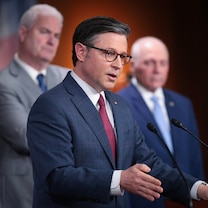Police officers killed surge 28% this year and some point to civil unrest and those looking to exploit it
The latest officer fatally shot on duty had just completed his rookie year.
Having gotten a taste for public service while in the U.S. Coast Guard, Jonathan Shoop joined the police force looking for a career he was passionate about after managing delivery teams for Amazon for nearly five years, his brother said.
For 405 days, the 32-year-old Shoop, according to his brother, lived what he realized was his calling in life as a member of the Bothell, Washington, police department.
Shoop became the 32nd U.S. law enforcement officer shot to death this year on July 13, marking a 28% jump in felonious officer deaths over the same period in 2019, according to data from the FBI.
In the wake of George Floyd's death at the hands of Minneapolis police in late May, tremendous scrutiny was placed on policing with peaceful protests broadly calling for reform. But accompanying that was a rise in an anti-police sentiment that, experts say, manifested itself in attacks on officers, patrol vehicles and precinct stationhouses, leaving cops around the country feeling under siege.
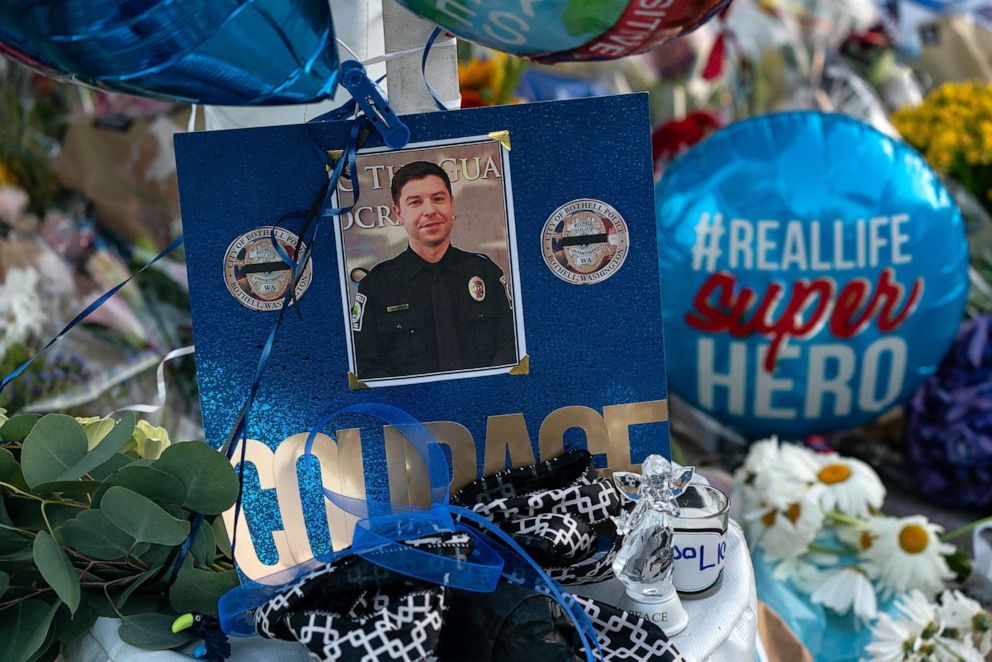
An ABC News review found that in recent years, periods of civil unrest coincided with an increase in police killings. While the sample size is small and a multitude of factors come into play in each situation, some experts say that an anti-police sentiment helps embolden offenders.
Maria "Maki" Haberfeld, a professor of police science at John Jay College of Criminal Justice in New York, said while she cannot definitively say that the increase in police officer slayings are related to the mass protests or the increase in anti-police rhetoric by demonstrators and politicians alike, police have become "scapegoats" for broader anger.
"Going out on the street and directing violence to somebody who represents the government, because police are an arm of the government, is the easiest thing to do," Haberfeld said. “There is a constant search for the scapegoat for whatever is happening in the society and the scapegoat ends up being law enforcement regardless of what it is that people have grievances about."
And Don Mihalek, a retired senior Secret Service agent and an ABC News contributor, said it is more than coincidental that the spike in police slayings has occurred during this tumultuous time in which hostilities have been aimed at law enforcement personnel.
“Any time the anti-police rhetoric heats up, it sends a message that it’s open season on law enforcement. We saw it in 2016 and we're seeing it now," Mihalek said.
The police killings have occurred amid a surge in gun violence this year following the spring peak of the coronavirus pandemic and right-wing extremists with anti-police views have also stepped up activities and some say may be looking to deepen the civil unrest the country is experiencing.
Seven of the U.S. officers killed this year were ambushed, according to the FBI data, including McAllen, Texas, police officers Edelmiro Garza, 45, and Ismael Chavez, 39, who died on July 11 when they responded to a disturbance call at a house and were met with gunfire. The 23-year-old suspect took his own life, police said.
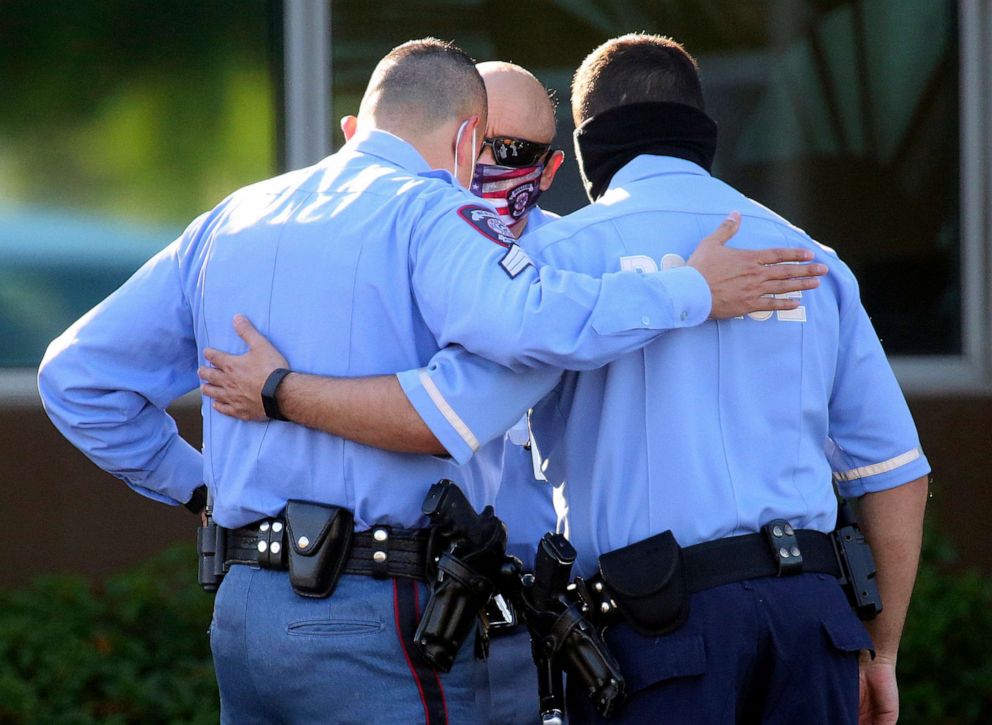
“The officers never had a chance to suspect a deadly assault on them," McAllen Police Chief Victor Rodriguez said at a news conference.
And the majority of killings happened in Southern and Western states (14 and 10 respectively), following a pattern from prior years. Seven occurred in the Midwest, and one in the Northeast.
'Driven to be a public servant'
Just days after celebrating the completion of his rookie year in law enforcement, Shoop died after he and his field-training officer, Mustafa Kumcur, pulled over a car missing a rear license plate. The driver initially stopped, but allegedly sped off as the officers were speaking to him, hitting a man on a scooter before crashing, according to a report released last Friday by detectives of the Snohomish County Multiple Agency Response Team (SMART).
The suspect, Henry Eugene Washington, 37, allegedly got out of his Pontiac G6 and charged at the pursuing police SUV, firing two rounds through the driver's side window where Shoop was behind the wheel, according to the report. Kumcur, who was hurt when a bullet ricocheted off his gun and hit him in the head, returned fire multiple times, but one of his shots is believed to have fatally struck Shoop, according to the SMART report.
Shoop's brother, Evan Shoop, said the latest details of the shooting don't change the fact that his brother is dead and a suspect with a gun allegedly initiated the fatal confrontation.
“Jonny spoke very highly of his training officer. He loved his training officer, and so do I. So, I don’t really have anything more to say about it than that," he told ABC News. "We don’t view this chaotic situation as his fault.”
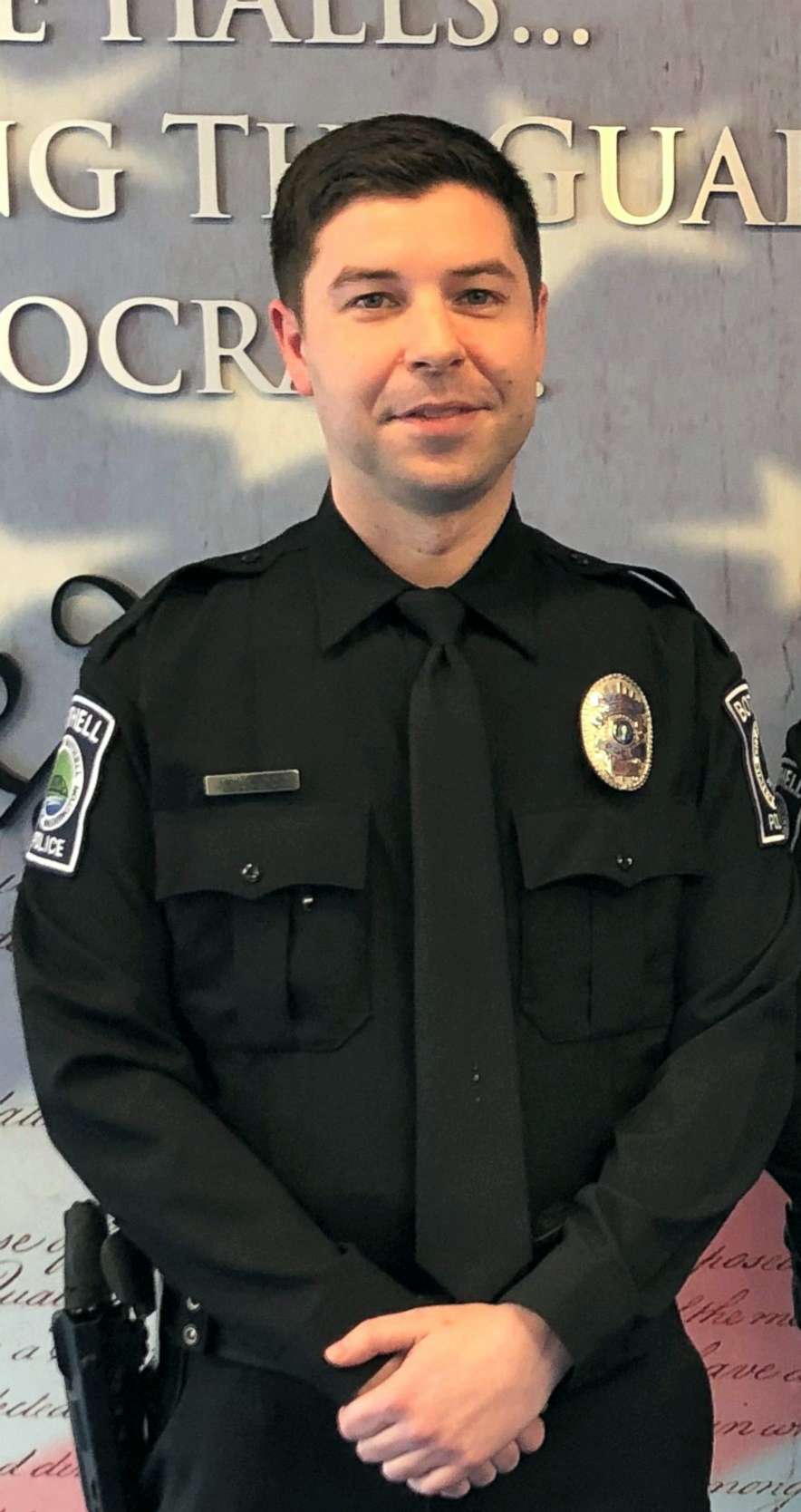
He said he and his family are not ready to speak of how his brother died and want to focus on how he lived as they make arrangements for his funeral.
“I don’t know if it was a dream, but he was driven to serve as an officer. He always was driven to be a public servant," he said, adding that prior to going to Amazon his brother worked as a marine operations supervisor for the Washington State Ferries.
The King County Prosecuting Attorney’s Office charged Henry Washington on Friday with aggravated first-degree murder in Shoop's killing. He was also charged with first-degree attempted murder and vehicular assault.
He has yet to enter a plea and was ordered to be held in jail without bail.
In an interview this week with ABC News affiliate KOMO, Washington's mother, Carolyn Washington of Texas, said her son was visiting Seattle and was not of sound mind.
"For them to lose their family, their brother, I’m so sorry. I'm so sorry," she said. "They have my deepest sympathies."
She said that she believes her son "didn’t intentionally do that."
Police killings rise in times of civil unrest
Police killings are a complicated matter -- involving a multitude of factors, this year primarily being linked to traffic stops and responses to domestic violence calls.
While FBI data doesn't directly link the slayings to the civil unrest or anti-police rhetoric, police advocacy groups and many law enforcement officials say the protests -- particularly when they become unruly -- can contribute to an anti-police atmosphere that puts officers in danger from those looking to exploit the situation.
One federal officer was fatally shot while guarding a federal building during a May 29 Black Lives Matter protest in Oakland, California. But the suspect arrested in the shooting, active duty Air Force Sgt. Stephen Carrillo, was linked to an emerging movement called "boogaloo," a term used by far-right extremists to signify a coming civil war and/or fall of civilization," according to federal court documents. Carrillo was also charged with the June 6 fatal ambush shooting of a Santa Cruz County sheriff's deputy in Ben Lomond, California.
Carrillo, who was not involved in the protests, has pleaded not guilty to murder charges.
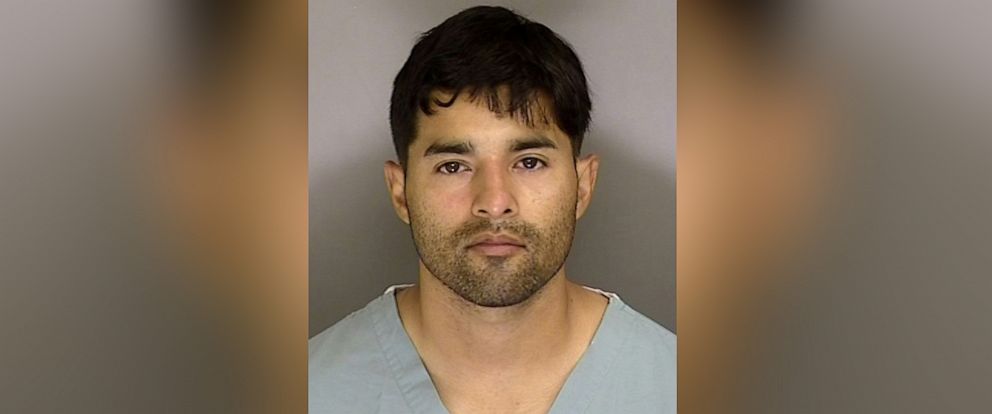
In June, retired St. Louis police Capt. David Dorn, 77, who was serving as police chief of Moline Acres, Missouri, was fatally shot while off duty trying to protect a friend's pawnshop that was being looted by a group of people, officials said. Dorn's killing came during the same week that four police officers were shot and wounded in St. Louis and one in Las Vegas as protests over Floyd's death turned increasingly violent for both protesters and police.
“As somebody who studies social science and does research in social science, you cannot be very definitive about this because the data is a little bit problematic," Haberfeld said. "If somebody has mental issues and decides to take it out on law enforcement because this is what he or she hears on the news that they are the enemy, it’s not necessarily something targeted, per se."
Still, recent FBI data show upticks in police officer killings during years when there have been major incidents of civil unrest across the country.
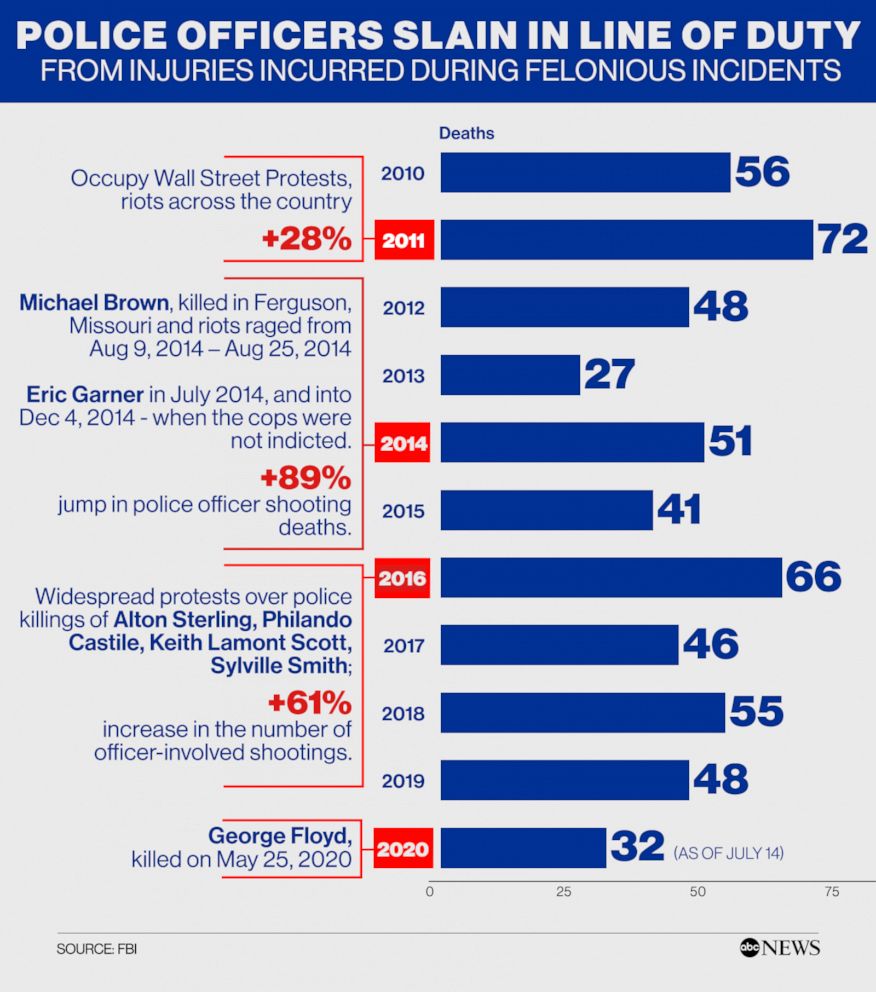
In 2016, protests raged across the country over a series of police-involved killings of Black men, including Philando Castile, 32, who was shot to death during a traffic stop in St. Anthony, Minnesota, when he reached for his wallet; and Alton Sterling, 37, who was fatally shot by Baton Rouge, Louisiana, police while pinned to the ground during an arrest. Slayings of police officers surged 61% from 41 in 2015 to 66 in 2016, including 17 who were ambushed, according to the FBI data.
While the officer who shot Castile was acquitted by a jury of manslaughter and reckless discharge of a firearm in 2017, the two officers involved in Sterlings death were not criminally charged.
Two years earlier in 2014, 51 police officers were slain in the line of duty up from 27 in 2013, an 89% jump. Seven of the officers were ambushed. However, the number of police officer killings in 2013 was the lowest in decades, according to the data, and the number of officer deaths due to felonious acts in 2014 was representative of what was seen in an average year.
The 2014 police officer slayings happened amidst the backdrop of protests that erupted across the country over the police shooting of Michael Brown, a Black teenager, in Ferguson, Missouri, and the police-involved chokehold death of Eric Garner, a 43-year-old Black man, in New York City. The officer who shot Brown and those involved in Garner's death were not criminally charged.
And in 2011, the year where Occupy Wall Street protesters clashed with police, law enforcement officers killed increased 28% to 72, including 15 who were ambushed.
“My heart and my prayers are so focused on these families," Lorraine Yaslowitz, the widow of a Florida police officer slain in 2011, told ABC News. Her husband, St. Petersburg Officer Jeffrey Yaslowitz, 39, and Sgt. Tom Baitinger, were fatally shot when they went to a home to arrest a man wanted for aggravated battery. The suspect, Hydra Lacy Jr., 39, a convicted felon, opened fire on the officers without warning when they found him hiding in an attic, officials said.
She said she still breaks down when speaking of her husband with their three children -- who were 5, 8, and 12 when their father was killed.
"It’s like the rug is pulled out from under you," she said.
And she said the venom directed at police officers has been hard for her to take in the wake of Floyd's killing.
“It’s a sensitive subject for our family because we’ve got so many people close to our children being stupid and ignorant and saying, ‘Oh, all cops are bad and we need to wipe them out,'” Yaslowitz said. “My blood boils when I watch my daughter struggling to answer back and stand up for what she believes without being hated."
'People feel vindicated attacking law enforcement'
Following the surge in shootings of police officers in 2011, Haberfeld participated in a study sponsored by the FBI to examine reasons for the deadly streak. What she found was a myriad of reasons, but hatred for police was not among the top motives.
“I think it was different back then. It was more related to issues of people who were trying to avoid going back to prison, or people with mental issues," Haberfeld told ABC News of the findings. “It was less related to what I am seeing right now. Right now it’s just violence against the police."
Haberfeld also said some suspects recently accused of perpetrating violence against law enforcement officers also vary from those seen in the past.
She noted that in late June, two attorneys from Brooklyn, New York, were among three people arrested and charged with tossing Molotov cocktails inside occupied New York Police Department vehicles.
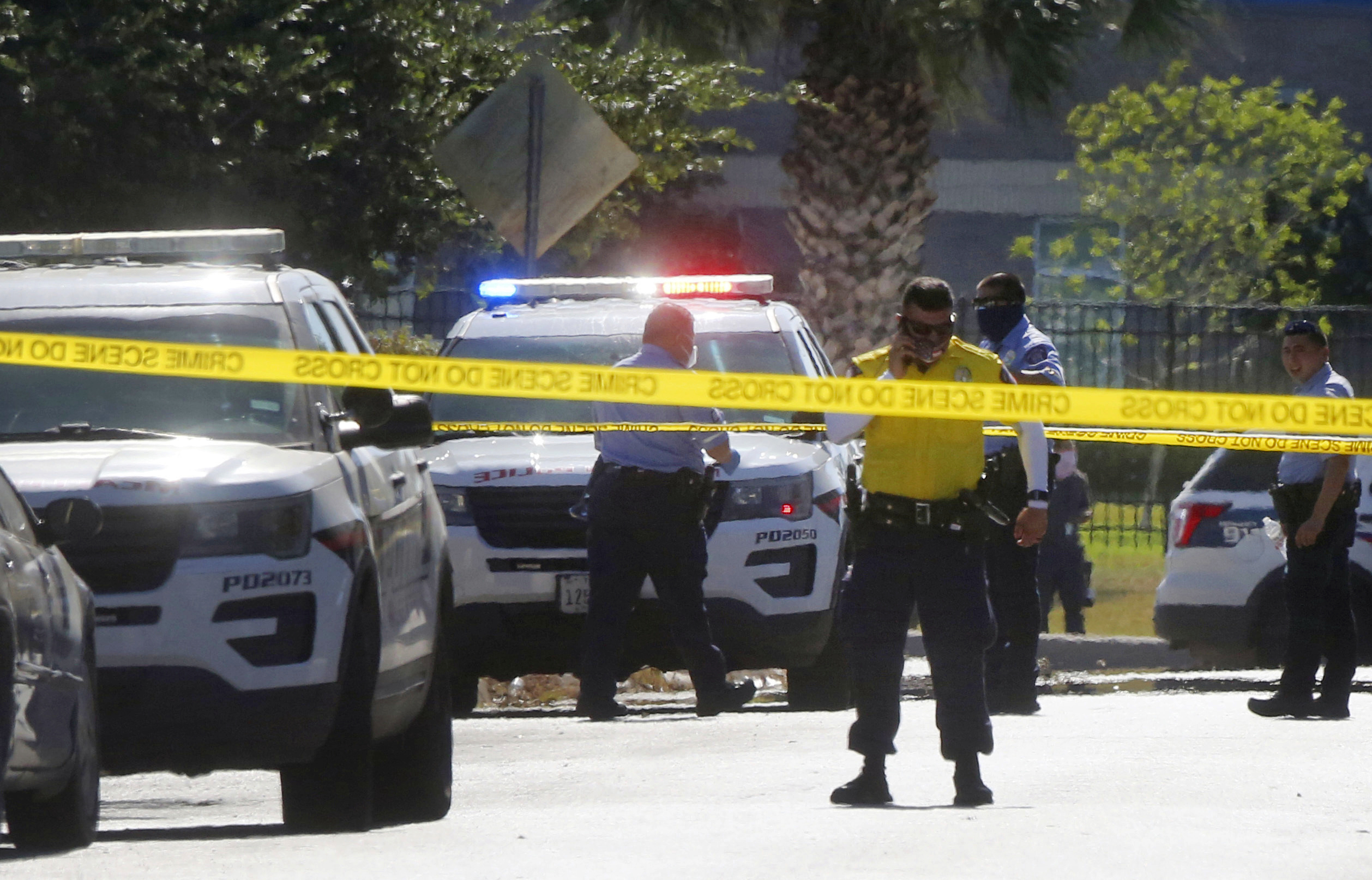
Mihalek said he believes that anti-police rhetoric espoused by some groups and politicians is helping to fan the flames of violence. Noting that attacks against law enforcement officers correlate with times when rhetoric is high, he said he anticipates violence against police to continue.
“If that follows the same pattern then the number will go up because now police have been painted as the bad guys and people feel vindicated attacking law enforcement," Mihalek said. "This is where the officials’ rhetoric can help or hurt depending on what they’re saying."
'The best younger brother'
Since Shoop's killing, a makeshift memorial of flowers and notes of condolences have piled up around his police SUV in downtown Bothell as residents expressed an outpouring of support for the first police officer in the city's history to be slain in the line of duty.
His brother, Evan said he visited the memorial on Thursday and was moved by the outpouring of respect residents of Bothell have shown his brother.
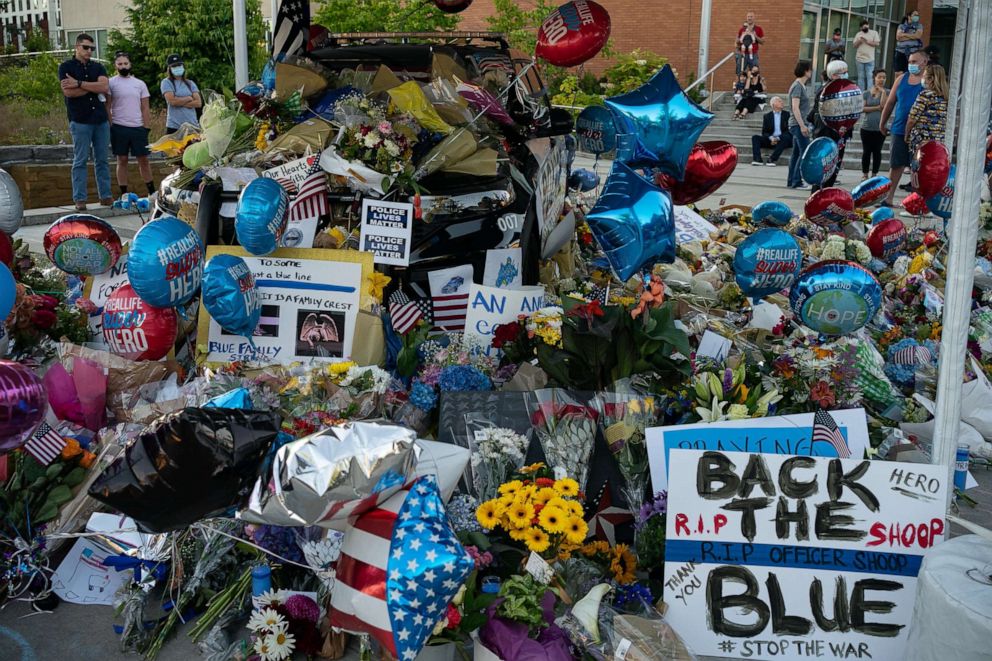
"He’s just beloved. He’s the best younger brother. I’m so lucky to have had him his whole life," he said. “I think one of the reasons we’re all struggling as a family is because we didn’t quite realize the extent to which Jonny was kind of the adhesive for us. It’s sinking in now and it’s tough, man. It’s really tough."
He said compounding the grief is the COVID-19 pandemic.
“The reality is that physically we can’t hug our mom when she needs it the most and it’s not fair," Evan Shoop said.
He described his mother, who is in her 70s and suffers from health issues, as being "gutted."
Evan Shoop said his brother's girlfriend is also devastated. “My brother adored her. She is part of our family and was before this. All of us knew that this is a serious thing and we were so looking forward to the next phase with them," he said. “This is somebody whose future Jonny was going to spend with."
He said his brother majored in history at the University of Washington, where he first joined the Coast Guard reserve program.
“He was just so smart," he said. "The guy always wanted to do the right things. He wanted to do a good job whether it was working at Amazon or the Coast Guard or policing. He was driven to do a good job."




